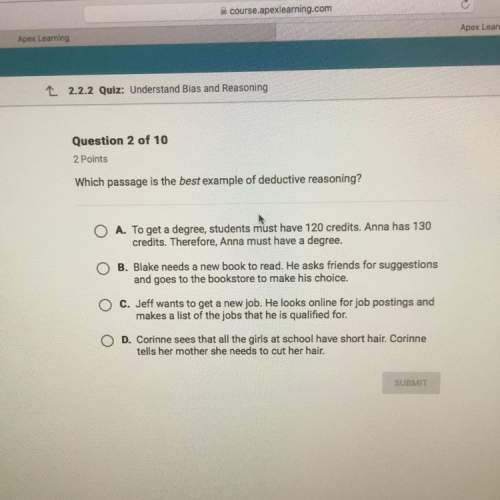
English, 17.12.2021 17:50 Leonardo8366
Passage A — Minerals, water, air, organic matter, and organisms make up the material we call soil. This material covers the Earth's surface and supports life. Without soil, plants would not grow, and animals would not survive.
Even though speaking about soil seems simple enough, it is actually very complex. That is because soil comes in many different forms which are made of layers, called horizons. When you look at the horizons together, you get a soil profile. Each horizon has its own set of characteristics. Some soil characteristics are the amount of sand, the type of minerals, and the amount of decomposing leaves found in the soil. All of these characteristics will help determine what kind of plant life the soil can support.
Passage B — Healthy plants are plants that are able to take sunlight, water, and nutrients and turn them into food. Their roots absorb two of these ingredients from the soil around them. The ideal soil for growing is one that contains the right amount of water without being too wet. It also contains many nutrients.
How do nutrients make it into the soil? The answer is actually quite complex. Nutrient-rich soil contains organic matter, which is broken-down plant and animal matter. As the plant and animal matter decays, or decomposes, it releases nutrients into the soil. Then, it is absorbed by living plants and turned into food. Therefore, the richer the nutrients in the soil, the healthier the plant.
Based on the information in Passages A and B, how do the nutrients in the soil determine what kind of plant it can support?
a
In order to get nutrients into the soil, plants and animals decompose, which means they are broken down and absorbed as food.
b
Plants absorb the nutrients they need from the soil to make food, so the type of nutrients in the soil need to match the type of nutrients needed by the plant.
c
Soil horizons share their nutrients so that plants and animals have enough food to survive, especially during the summer season.
d
The minerals, water, and organic matter in the soil keep plants from growing large, so plants need to choose a spot that doesn't have any of those things.

Answers: 3
Another question on English

English, 21.06.2019 21:40
4.in those days the church was not merely a thermometer that recorded the ideas and principles of popular opinion; it was a thermostat that transformed the mores of society. •type of figurative language: •meaning of figurative language: •effect on tone and mood: •effect on audience: choose out of these: hyperbole, irony, historical question, paradox, allusion,metaphor,personification,symbolism and simile
Answers: 3

English, 21.06.2019 22:10
Which answer best explains the consequences of the mass hysteria that took place during the salem witch trails
Answers: 3

English, 22.06.2019 00:30
How many syllables does a tanka have? a. 31 b. 17 c. 14 d. 10
Answers: 2

English, 22.06.2019 04:30
The process in which applications are reviewed based on academic performance completion of rigorous course work and extracurricular activities is called
Answers: 1
You know the right answer?
Passage A — Minerals, water, air, organic matter, and organisms make up the material we call soil. T...
Questions



Mathematics, 04.05.2021 07:20

Advanced Placement (AP), 04.05.2021 07:20



History, 04.05.2021 07:20

Mathematics, 04.05.2021 07:20



Mathematics, 04.05.2021 07:20

Mathematics, 04.05.2021 07:20

History, 04.05.2021 07:20


History, 04.05.2021 07:20


English, 04.05.2021 07:20


Mathematics, 04.05.2021 07:20




